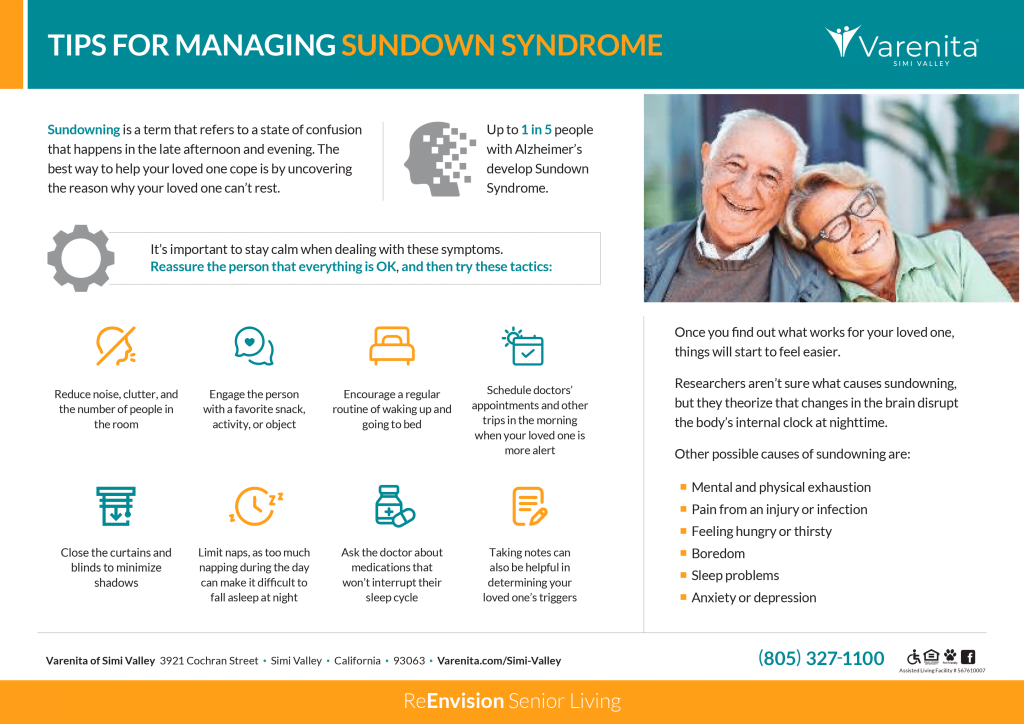Memory Care
What is Sundowning and Tips for Coping

Sundowning is a term that refers to a state of confusion that happens in the late afternoon and evening. It is not a disease but rather a group of symptoms that can happen to people with dementia. While the exact cause of sundowning is unknown, there are some helpful tips for dealing with this type of behavior.
Sundowning often comes as a surprise for family members because it can cause a variety of behaviors such as confusion, aggression or anxiety. To complicate matters, these behaviors appear at the end of the day when caregivers are most tired.
Let’s learn more about sundowning, the possible causes for it and tips for coping.
How to Recognize Sundowning
People living with Alzheimer’s or dementia experience changes in the brain. These changes likely have a direct link to sundowning, particularly if there are no other environmental factors present. One possible theory is that alterations in the brain affect the biological clock, resulting in confused sleep-wake cycles. This could be the reason why some people exhibit agitation and other aggressive behaviors.
When someone is going through a sundowning episode, they are often restless, confused and irritable. They may also yell, pace around the room, see things that aren’t there or have similar delusions. These episodes can be scary for caregivers, especially when it’s the end of the day and they’re tired, too!
Up to 1 in 5 people with Alzheimer’s develop sundown syndrome. But it can happen to older adults without dementia as well. Usually when sundowning becomes a problem, most families and caregivers seek professional care such as a local memory care community in the Simi Valley area. This is the safest option, and provides peace of mind to caregivers by ensuring their loved one can receive around-the-clock support.
What are the Causes of Sundowning?
Researchers aren’t sure what causes sundowning, but the theory is that changes in the brain disrupt the body’s internal clock and cause confusion at night. The area of the brain that signals when you’re asleep or awake breaks down in people with dementia.
Other possible causes of sundowning are:
- Mental and physical exhaustion
- Pain from an injury or infection
- Feeling hungry or thirsty
- Boredom
- Sleep problems
- Anxiety or depression
Tips for Managing Sundown Syndrome
The signs of sundowning typically appear in the late afternoon and early evening. You might find that your loved one has increased confusion or agitation, or they may pace and wander around. The best way to cope with sundowning is by uncovering the reason why your loved one can’t rest. However, finding the underlying reason isn’t always so clear.
Also, it’s important to know that when dealing with someone who has sundown syndrome, you must stay calm. Getting angry or frustrated with your loved one will only make them more nervous and irritable. Reassure the person that everything is OK. Here are some tips to try:
- Reduce noise, clutter and the number of people in the room. Too much stimulation during the evening hours can add to the confusion.
- Distract the person with a favorite snack, activity or object. For example, you can read a book, listen to soothing music or take a walk.
- Encourage a regular routine of waking up and going to bed. Schedule doctors’ appointments and other trips in the morning when your loved one is more alert.
- Close the curtains and blinds to minimize shadows. Shadows can confuse people with Alzheimer’s and cause them to act out.
- Limit naps. Too much napping during the day can make it difficult to fall asleep at night.
- Ask the doctor about medications. You might have to switch up your loved one’s medications so they don’t interrupt their sleep cycle.
Taking notes can also be helpful in determining your loved one’s triggers. For example, if you find that the wandering and agitation is worse on the days your loved one takes a nap, then you know that you’ll have to limit daytime napping.

How Memory Care in Simi Valley Can Help
When a person has sundown syndrome, it’s crucial that they are kept safe and have around-the-clock supervision. Because most families are not able to provide this level of care, it’s usually around this time that they consider dementia care in Simi Valley. Assisted living communities are used to dealing with people who have sundown syndrome and are comfortable providing one-on-one attention.
At Varenita of Simi Valley, we start by creating a consistent schedule, maximizing activities during the day and limiting napping. By creating and sustaining an active, holistic lifestyle, we’re often successful in reducing sundowning behaviors in our residents. If this behavior does continue, rest assured that our dementia facilities in Simi Valley are equipped to handle it.
In addition to our safe, secure facilities, all staff members are trained on how to engage with residents with memory impairment. Our team members will be sure to give your loved one the compassion and understanding they deserve. These connections help our residents stay calm and positive during sundowning episodes.
To learn more about our active retirement communities in Conejo Valley and how we handle cases of sundowning, please contact Varenita of Simi Valley today.